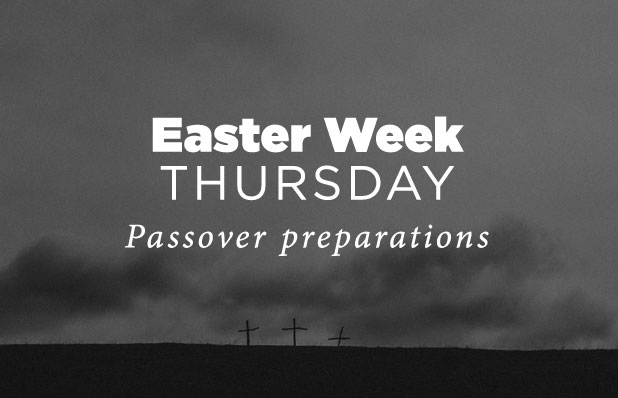
MAUNDY THURSDAY: PASSOVER PREPARATIONS (April 2, AD 33)
Matt 26:17-46; Mark 14:12-42; Luke 22:14-46; John 13-17
The action really picks up on "Maundy Thursday" with the Upper Room discourse that lasts from John 13-17, as his disciples prepare to celebrate Passover. Maundy comes from the Latin word for "command" found in John 13.
Jesus the Servant
John's account of Thursday begins with Jesus washing the disciples' feet. Cleaning feet was a dirty, lowly job for servants.
Some might have trouble imagining a dirty job. I had a friend who supported his family through seminary as a maintenance man, and one of his jobs was to use his hand to clean out a pipe that chopped up sewage before it would travel from the school into the sewer. Sometimes it would get clogged and he would have to reach in with his hand and clean it out. That's a dirty job for anyone. That might seem more extreme than what Jesus did if not for his identity.
God the Father sent his eternal Son to take on human flesh to redeem sinners. The King of Kings came down to serve us, not to be served by us.
Consider that. Don't rush over it. Creator and Sustainer of the Universe, God the Son, came down from heaven and then stooped down to wash the disciples' feet. He had to humble himself to make dirty sinners fully clean. What other god stoops down this low to serve fallen, rebellious humanity?
Jesus explains in John 13:14-16:
"If I then, your Lord and Teacher, have washed your feet, you also ought to wash one another’s feet. For I have given you an example, that you also should do just as I have done to you. Truly, truly, I say to you, a servant is not greater than his master, nor is a messenger greater than the one who sent him."
Jesus left his disciples an example of what restored humanity ought to look like. Jesus reveals that he is a different kind of King who did not come be served but to serve.
When I read of Jesus washing the disciples' feet, my reflex is to think someone else would have been a better candidate for that job. Shouldn't Jesus be healing the sick, raising the dead, or casting out demons? Jesus has a unique resume. This scene seems to depict Jesus as underemployed!
In fact, Judas can’t stomach it anymore. Jesus isn’t the Messiah he was waiting for. He wanted a warrior king, not a servant king. Judas misunderstood his great need: redemption. Judas misunderstood his great problem: indwelling sin.
Judas failed to see that he was unworthy of the Kingdom of God and needed Jesus to deliver him from the domain of darkness. Judas hated the gospel because he was blind to his deep brokenness and guilt before God. Judas looks like the opposite of Jesus.
Self-seeking desire drives Judas but self-sacrifice drives Jesus. Of course, both would lead to death, but only one would end in death.
Take note that Jesus gives his disciples a new command in John 13:34-35 on Maundy Thursday:
"A new commandment I give to you, that you love one another: just as I have loved you, you also are to love one another. By this all people will know that you are my disciples, if you have love for one another."
The humility of Jesus washing the disciples' feet demonstrated love in a way that faintly anticipates the mind-boggling reality of cross-shaped love, where Christ would humble himself to death on a cross.
Romans reserved the cross for the worse sinners. Judas would later face death on a cursed tree, as would Jesus. Both died but both experienced radically different outcomes. Judas, the self-seeker, sought life and it ended in death. Jesus, the self-giver, came to die and did die, but would be raised from the dead.
Reflection
- What does "maundy" mean?
- What does Jesus do for the disciples?
- How does this point forward to what Jesus is about to do for the disciples?
- How does Jesus say this should shape their life together?
Art: Draw Jesus washing the disciples' feet. Kids you can also wash your own feet; how long has it been?